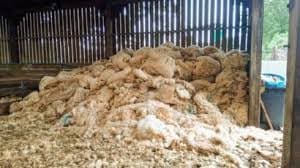A farmer today revealed how the low cost of wool has forced him to use fleeces from his flock of 2,000 sheep for compost, instead of selling them.
David Jones, whose family has farmed on the Long Mynd for generations, said the situation was ridiculous but that the low price of wool meant it was more valuable as manure than for sale.
He said that the fleeces from his flock would have only fetched a few hundred pounds, at the cost of a few pence each. Instead they will be buried in fields with manure.
Mr Jones believes the country should be looking at ways to use materials such as highland wool for insulation for homes. He said: “It has been on the downward slope for many years but Covid has accelerated it like many things. It is poorer quality wool because it is Welsh Mountain wool so it is a low value to start with. It is not worth all the work to package it up into wool bags, put it on the trailer and take it to Newtown. It is worth more to us as manure than it is taking it up there for a few hundred pounds.”
Other countries have been using wool to make insulation for homes, something Mr Jones said should be pursued in the UK. He said: “It seems silly, people talk about wanting a green society and you have a renewable source of material and it is basically not wanted. It is one of the most efficient insulators out there.”
Mr Jones said that previous to the pandemic large amounts of British wool are shipped to China to be processed and that now there is an opportunity to look at what British business could do with the product.
He said: “I think it is time we did more in house. It would be a great job creator. It needs the government to look at these things. There is possible job creation here and they can help set companies up, there must be a market there and people would buy the stuff.”
John Burt, who has been helping Mr Jones with the shearing, has written to local MP Philip Dunne outlining his concerns about the situation and his further worries about the impact of a no deal Brexit on sheep farmers.
He said: “This farmer received £700 from the Wool Marketing Board for five tonnes of wool, representing revenue of 28p per fleece. The shearers alone are paid £1 per fleece (and this farmer has a good deal – many pay more). Thus, last year’s revenue was £700 and the payment to shearers was £2,500, plus other expenses associated with the process.
Devastation
“This year, the revenue is likely to fall drastically as I understand that demand from China has plummeted. Thus, the decision that it will not be worth delivering the wool to the board and to use it as fertiliser.”
Mr Burt said he was concerned about the potential for a 40 per cent tariff on sheep meat if the UK cannot reach a Brexit deal.
He said: “It is not difficult to foresee the devastation that will fall upon our hill farmers, their communities and the landscape.”
Mr Burt has, like Mr Jones, urged the government to look at supporting alternative uses for wool – such as insulation.
He said: “The Chancellor announced generous home insulation grants: it seems to me that these should be on condition that wool be used for loft insulation.”

